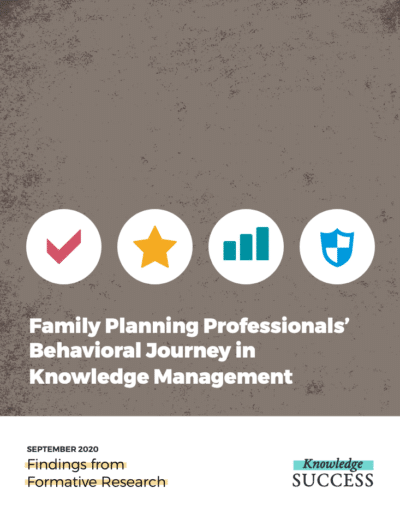There is a wealth of family planning and reproductive health knowledge accumulated through research and practical programmatic experience. However, ensuring that this knowledge is shared among FP/RH professionals, accessible to all, and applied in practice remains a challenge. Knowledge SUCCESS is working directly with FP/RH professionals around the world to design better tools and solutions to support their work in FP/RH programs as they seek relevant information, share evidence and best practices, and apply learnings to their context. This report explores formative research findings and specific behavioral economics mechanisms – like choice overload, cognitive overload, learning preferences, social norms, and incentives – that are relevant to the ways in which family planning and reproductive health professionals seek out and share information.
The report recommends how organizations and programs can address barriers and opportunities, and explains the implications of these findings for knowledge management within the FP/RH community. It seeks to identify the current behaviors, motivations, needs, and opportunities with regards to knowledge management (KM)—specifically focusing on seeking, sharing, and using knowledge—among the FP/RH community.
This report is made possible by the support of the American People through the U.S. Agency for International Development under the Knowledge SUCCESS Project. Knowledge SUCCESS is supported by USAID’s Bureau for Global Health, Office of Population and Reproductive Health and led by the Johns Hopkins Center for Communication Programs (CCP) in partnership with Amref Health Africa, Busara Center for Behavioral Economics (Busara), and FHI 360. A critical component of the project’s work is to apply behavioral science methodologies and a behavioral economics (BE) framework to designing new KM solutions and improving existing ones.


